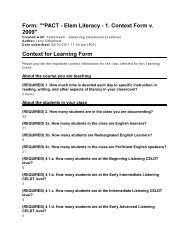The Tutoring Book - California State University, Sacramento
The Tutoring Book - California State University, Sacramento
The Tutoring Book - California State University, Sacramento
Create successful ePaper yourself
Turn your PDF publications into a flip-book with our unique Google optimized e-Paper software.
How to Encourage Passive Tutees<br />
70<br />
Phillip Louie<br />
Spring 2011<br />
One of the most common challenges in trying to be a non-directive tutor is working with tutees<br />
who perhaps because of shyness or insecurity are overly quiet, passive, and unresponsive. When you ask<br />
them to brainstorm ideas, they sit there staring blankly at their paper. When you pose questions to them,<br />
they ask you for the answer. And their most common response to most any prompting begins with “I<br />
don’t…” or “I can’t….”<br />
It’s easy to jump to conclusions when working with such tutees, especially after comparing them<br />
to those who are more enthusiastic and overtly motivated; some tutors might, for example, be inclined to<br />
blame themselves for their lack of experience or charisma, while others might prefer to blame their tutees<br />
for their laziness or diffidence. While such feelings may be understandable (and in some cases even<br />
justified), playing the blame game is almost certainly not going to be very productive for either you or<br />
your tutee. What ought to be done, rather, is to figure out what positive steps can be taken to break out of<br />
this familiar trap and get the most out the limited time you have to work with your tutees.<br />
But before dispensing my own advice on the matter, I’d like to come clean and admit that<br />
although I have taken up the discussion of this topic for my <strong>Tutoring</strong> <strong>Book</strong> article, I am certainly not any<br />
kind of expert on transforming passive, stubborn, or unenthusiastic students into model tutees. What has<br />
largely enabled me to write this <strong>Tutoring</strong> <strong>Book</strong> entry is not my own reservoir of knowledge and expertise<br />
on the subject accrued from my experiences at the Writing Center but the invaluable input I’ve received<br />
from my colleagues and from Professor Melzer in asking what they might do were they in my situation.<br />
Similarly, if you get a tutee who has you frustrated, one of the best things you can do is probably not to<br />
run to the nearest computer so you can refer to this <strong>Tutoring</strong> <strong>Book</strong> entry but to simply ask your peers or<br />
mentors (don’t forget about the GACs) for advice on your specific situation (in fact, the same holds true<br />
when dealing with any issue you might encounter during your time at the Writing Center). After all, even<br />
if I was the authority on the matter, there’s no way I could address what to do in every possible situation<br />
in a mere two and a half page essay.<br />
And just as important as collaborating with one’s peers is collaborating with one’s tutees.<br />
Usually, when speaking of working collaboratively to help one’s tutees overcome their challenges, we’re<br />
talking about helping them overcome HOCs or LOCs. But in this case, the issue at hand hasn’t anything<br />
to do with a lack of any kind of skill or body of knowledge but with certain attitudes or perceptions that<br />
interfere with their holding up their end of the collaborative relationship between tutor and tutee.<br />
So yes, my suggestion is to work collaboratively with one’s tutees in order to overcome their<br />
attitudinal problems (I hesitate to use the term “attitude problem,” as this connotes defiance or resentment<br />
on one’s part, and while defiance and resentment can of course be the source of a tutee’s passivity, it’s not<br />
the only one possible). To do this, we do what we so frequently do anyway in being non-directive,<br />
minimalist collaborators: we invite them to offer their own opinions instead of telling them what to do. If,<br />
for example, we have tutees who are very unresponsive and don’t offer their own thoughts and ideas in<br />
brainstorming sessions, we might begin by asking why this is the case. <strong>The</strong> trick, of course, is to do this in<br />
an inoffensive, non-confrontational way that doesn’t make you come across as angry, resentful, etc. One<br />
possible way this, in turn, might be done is to ask them about the issue in a way that exudes concern<br />
rather than negativity. If you suspect that your tutees underperform during your sessions because of<br />
nervousness, shyness, or stress, you might try sympathizing with them by first asking them if this in fact<br />
what is preventing them from performing to the best of their ability. <strong>The</strong>n, if they answer affirmatively,

















